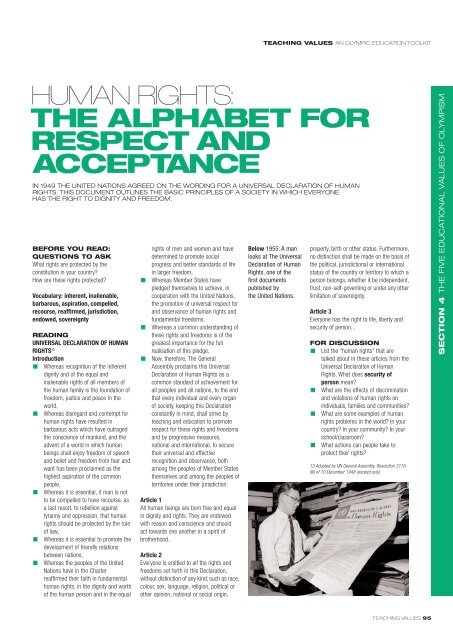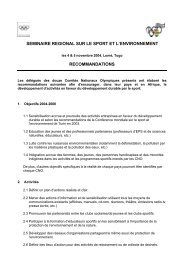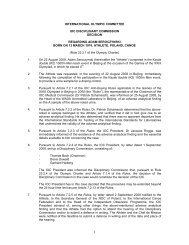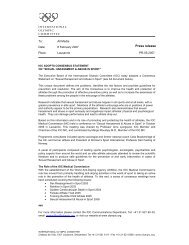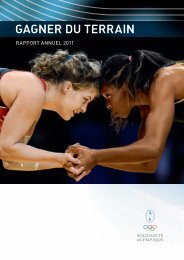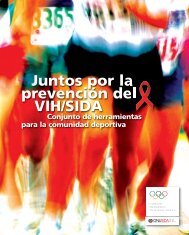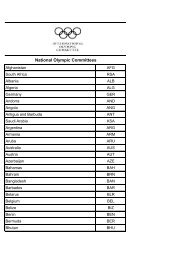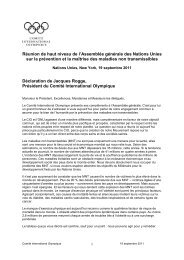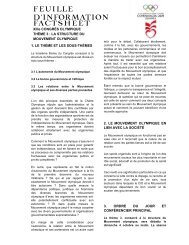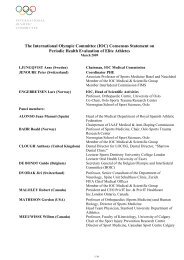Teaching Values- An Olympic Education Toolkit - International ...
Teaching Values- An Olympic Education Toolkit - International ...
Teaching Values- An Olympic Education Toolkit - International ...
Create successful ePaper yourself
Turn your PDF publications into a flip-book with our unique Google optimized e-Paper software.
TEACHING VALUES AN OLYMPIC EDUCATION TOOLKIT<br />
HUMAN RIGHTS:<br />
THE ALPHABET FOR<br />
RESPECT AND<br />
ACCEPTANCE<br />
IN 1949 THE UNITED NATIONS AGREED ON THE WORDING FOR A UNIVERSAL DECLARATION OF HUMAN<br />
RIGHTS. THIS DOCUMENT OUTLINES THE BASIC PRINCIPLES OF A SOCIETY IN WHICH EVERYONE<br />
HAS THE RIGHT TO DIGNITY AND FREEDOM.<br />
BEFORE YOU READ:<br />
QUESTIONS TO ASK<br />
What rights are protected by the<br />
constitution in your country?<br />
How are these rights protected?<br />
Vocabulary: inherent, inalienable,<br />
barbarous, aspiration, compelled,<br />
recourse, reaffirmed, jurisdiction,<br />
endowed, sovereignty<br />
READING<br />
UNIVERSAL DECLARATION OF HUMAN<br />
RIGHTS 13<br />
Introduction<br />
Whereas recognition of the inherent<br />
dignity and of the equal and<br />
inalienable rights of all members of<br />
the human family is the foundation of<br />
freedom, justice and peace in the<br />
world,<br />
Whereas disregard and contempt for<br />
human rights have resulted in<br />
barbarous acts which have outraged<br />
the conscience of mankind, and the<br />
advent of a world in which human<br />
beings shall enjoy freedom of speech<br />
and belief and freedom from fear and<br />
want has been proclaimed as the<br />
highest aspiration of the common<br />
people,<br />
Whereas it is essential, if man is not<br />
to be compelled to have recourse, as<br />
a last resort, to rebellion against<br />
tyranny and oppression, that human<br />
rights should be protected by the rule<br />
of law,<br />
Whereas it is essential to promote the<br />
development of friendly relations<br />
between nations,<br />
Whereas the peoples of the United<br />
Nations have in the Charter<br />
reaffirmed their faith in fundamental<br />
human rights, in the dignity and worth<br />
of the human person and in the equal<br />
rights of men and women and have<br />
determined to promote social<br />
progress and better standards of life<br />
in larger freedom,<br />
Whereas Member States have<br />
pledged themselves to achieve, in<br />
cooperation with the United Nations,<br />
the promotion of universal respect for<br />
and observance of human rights and<br />
fundamental freedoms,<br />
Whereas a common understanding of<br />
these rights and freedoms is of the<br />
greatest importance for the full<br />
realisation of this pledge,<br />
Now, therefore, The General<br />
Assembly proclaims this Universal<br />
Declaration of Human Rights as a<br />
common standard of achievement for<br />
all peoples and all nations, to the end<br />
that every individual and every organ<br />
of society, keeping this Declaration<br />
constantly in mind, shall strive by<br />
teaching and education to promote<br />
respect for these rights and freedoms<br />
and by progressive measures,<br />
national and international, to secure<br />
their universal and effective<br />
recognition and observance, both<br />
among the peoples of Member States<br />
themselves and among the peoples of<br />
territories under their jurisdiction.<br />
Article 1<br />
All human beings are born free and equal<br />
in dignity and rights. They are endowed<br />
with reason and conscience and should<br />
act towards one another in a spirit of<br />
brotherhood.<br />
Article 2<br />
Everyone is entitled to all the rights and<br />
freedoms set forth in this Declaration,<br />
without distinction of any kind, such as race,<br />
colour, sex, language, religion, political or<br />
other opinion, national or social origin,<br />
Below 1955: A man<br />
looks at The Universal<br />
Declaration of Human<br />
Rights, one of the<br />
first documents<br />
published by<br />
the United Nations.<br />
property, birth or other status. Furthermore,<br />
no distinction shall be made on the basis of<br />
the political, jurisdictional or international<br />
status of the country or territory to which a<br />
person belongs, whether it be independent,<br />
trust, non-self-governing or under any other<br />
limitation of sovereignty.<br />
Article 3<br />
Everyone has the right to life, liberty and<br />
security of person...<br />
FOR DISCUSSION<br />
List the “human rights” that are<br />
talked about in these articles from the<br />
Universal Declaration of Human<br />
Rights. What does security of<br />
person mean?<br />
What are the effects of discrimination<br />
and violations of human rights on<br />
individuals, families and communities?<br />
What are some examples of human<br />
rights problems in the world? In your<br />
country? In your community? In your<br />
school/classroom?<br />
What actions can people take to<br />
protect their rights?<br />
13 Adopted by UN General Assembly. Resolution 217A<br />
(III) of 10 December 1948 (excerpt only)<br />
SECTION 4 THE FIVE EDUCATIONAL VALUES OF OLYMPISM<br />
TEACHING VALUES 95


